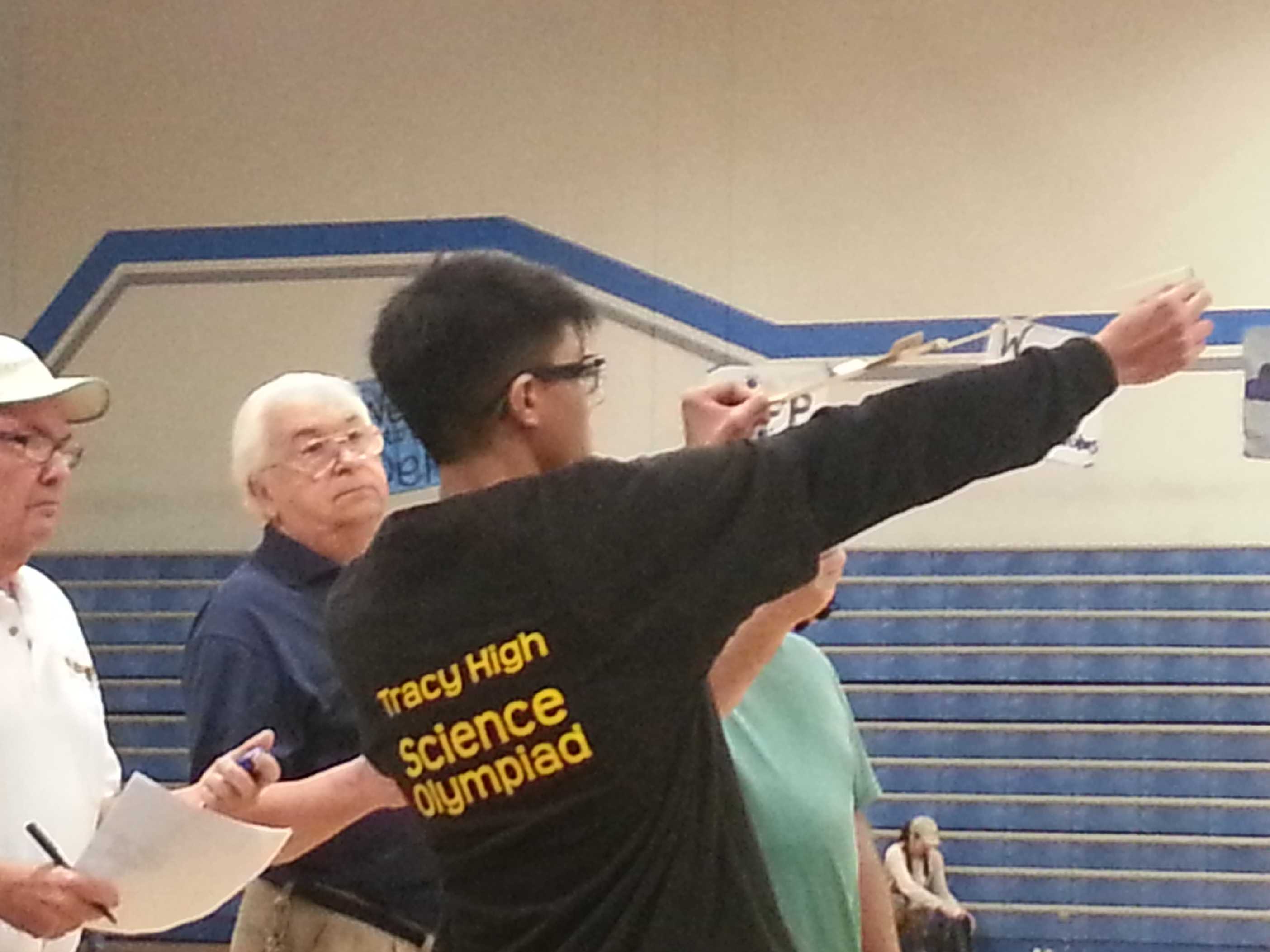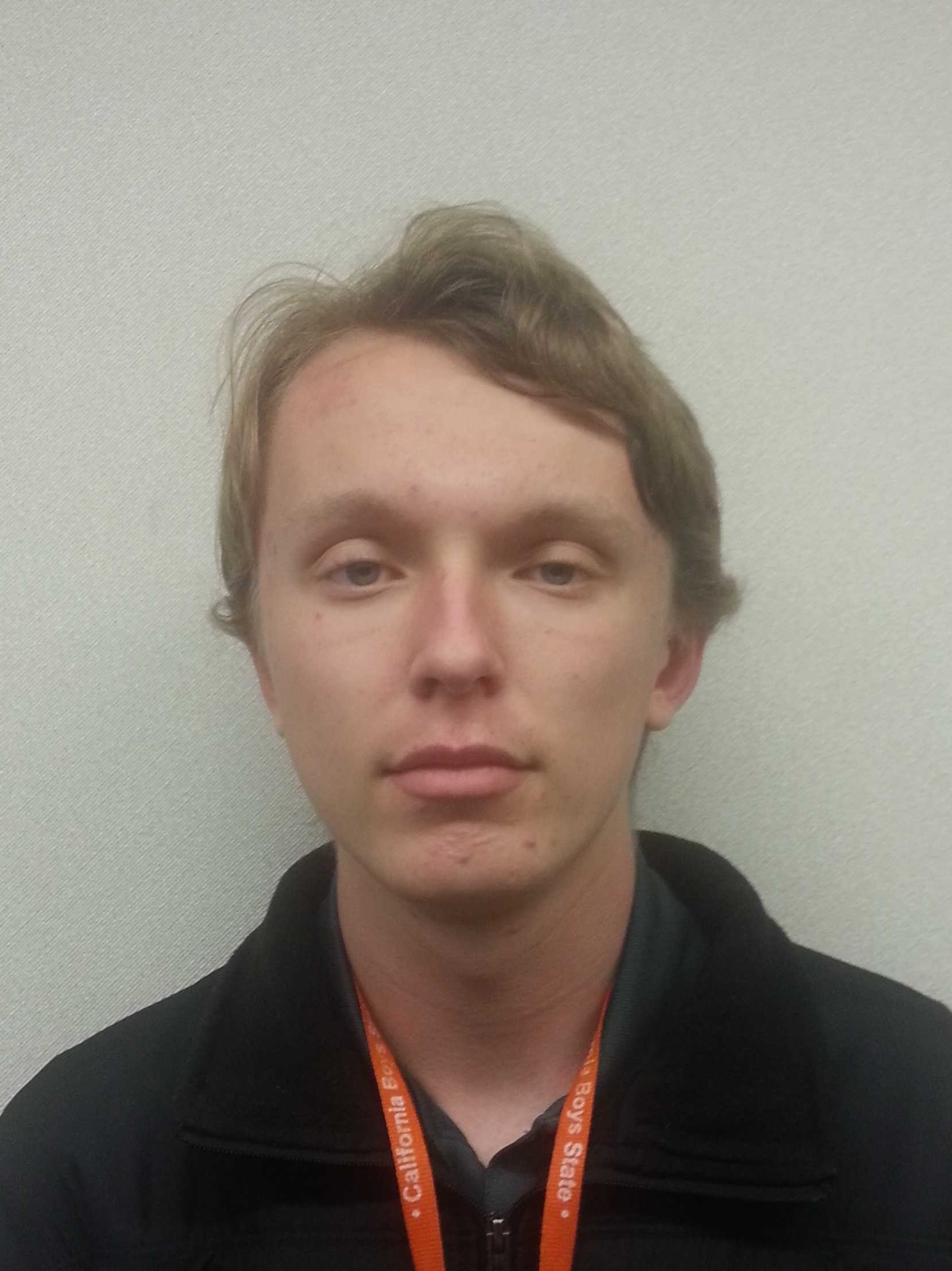Science Olympiad teams heading to regional competition
At last year’s Science Olympiad competition, Miguel Taruc launched his plane for the Elastic Launch Glider event.
February 27, 2014
Tracy High School’s Science Olympiad team will be competing at the county competition this Saturday, March 1, at the University of the Pacific (U.O.P.) in Stockton. Tracy High School will send both its green and gold teams to compete.
The green team is the more advanced team, with members typically having more years of experience in Science Olympiad.
Ken Wedel, a science teacher, started coaching Science Olympiad in 2003. However, he was not the first Science Olympiad coach at Tracy High.
“The Science Olympiad team was actually here already under Sally Hutsell,” Wedel said. Kirk Brown, former Tracy High science teacher, suggested that I take over coaching it, since Sally wanted to do some different things. It was under Kirk Brown’s urging that I tried coaching Science Olympiad.”
Now in his 11th year as coach, Wedel has seen Science Olympiad grow from one team with eight students to this year’s two teams with 15 students each.
Students started preparing for the competition in Oct. Each student is responsible for three to four events, and each event has at least two people involved, with some events, such as Mission Impossible, consisting of three people.
Farwa Feroze, a senior at Tracy High School who started Science Olympiad in sixth grade, noted the flexibility in choosing events.
“You definitely get to choose your first event, and probably your second event,” Feroze said. “You usually get the events that you want. I was an officer, so I get four events, usually you get three events.”
For Feroze, one particular Science Olympiad event stands out to her: Forensics. Having participated in the event every year, Feroze marks this year as her seventh and final year.
“There’s an event I do every year called Forensics and in middle school it’s called Science Crime Busters. That one is trying to figure out suspects, like a CSI investigation,” Feroze said. “They give you suspects and evidence, and you do different tests to figure it out. For example, they give you powder identification. They’ll give you 10 different white powders and you’ll do different tests to figure it out, like acid tests, conductivity tests, solubility tests, Benedict’s, and pH.”
In order to perform well at the competition, students study for their events months before the competition. However, senior Peter Van Ausdeln, who has participated in Science Olympiad since the fifth grade, pointed out that the events are not particularly hard to study for, given the resources available.
“The events are not really hard to study for because there’s a lot of good resources, especially online,” Van Ausdeln said. “If you go online to forums, people will be more than willing to help you. The Science Olympiad community is really good about helping each other.”
Although the events themselves focus on science, students learn additional helpful study skills. Senior Philip Hwang, who started participating in Science Olympiad in the sixth grade, remarked that because of studying for Science Olympiad, the way he processes information has changed.
“Often times in the events we need a cheat sheet of some sort,” Hwang said. “The process of making it taught me new ways to learn and take in information, especially extremely large amounts of information.”
With the benefit of studying science on their spare time, students can easily recall science facts, even seemingly random but fascinating tidbits. When prompted for a “cool science fact,” Feroze immediately had an answer.
“Lithium chloride burns magenta,” Feroze said. “Lithium chloride is a white powder.”
Wedel had another science fact to offer, based on his observations over the years.
“A science fact I’ve learned from Science Olympiad is that the shorter amount of time there is until the event, the more productive you become,” Wedel said. “That’s my ‘observed’ science fact.”
With all the studying occurring, Wedel expressed his hopes for the regional competition.
“Well of course I hope that we do very well. We have a lot of competition,” Wedel said. “At the high school level I believe there’s going to be 16 or 18 teams. Our long-standing goal is to beat Tokay High School. We’ve come in second to them several times. We’d like to take their first-place spot away, but they’re very well funded, organized, and active, so it’ll definitely be a challenge.”
However, students noted that the Science Olympiad competition is memorable for more than the events themselves. Hwang emphasized the recognition aspect of Science Olympiad as he recalled his favorite Science Olympiad memory.
“My favorite memory is the first time I got a medal, which was in seventh grade. In sixth grade I didn’t get anything. Seeing everyone else go up—you’re happy for them but you’re wondering why you didn’t get anything,” Hwang said. “The next year was the time I got the first medal. Walking down the stairs to get to the medal I could feel my heart beating. As small of a thing as it is, just being recognized is exhilarating.”
Wedel’s hard work has not gone unnoticed. Two years ago, the San Joaquin County Office of Education recognized his dedication to Science Olympiad.
“They voted me into the Science Olympiad hall of fame,” Wedel said. “That was a very proud moment for me, to be recognized for all the work I have been doing.”
All efforts involve lessons learned, and Science Olympiad is no exception. Students offered their advice to future students of Science Olympiad.
“Don’t leave things to the last minute,” Feroze said.
Some lessons are learned harder than others. Van Ausdeln recounted an experience that although was initially disappointing, ultimately taught him to prepare better for Science Olympiad.
“It was sophomore year. At that point I was essentially dominating in the events that I entered,” Van Ausdeln said. “Then sophomore year, I didn’t really prepare very well for my events and then I got completely devastated. I didn’t even get close to medalling in anything.”
Because of this experience, Van Ausdeln prepared more for his events his junior year and received medals. Students and coaches always are looking for ways of improvement. Wedel stressed that students should procrastinate less.
“It’s a matter of making sure that they continuously practice for their events over time, not so much at the last time, but I think that’s with every student,” Wedel said. “Procrastination is the hall of fame word.”
Feroze indicated that the area the team needed to improve upon the most was holding more group meetings when everyone gets together, although she noted the difficulties of getting everyone together.
“There are two teams. There’s a green team and a gold team, and there are 15 people on each team,” Feroze said. “Having everyone meet on one day is really difficult. This year we only met three times.”
For many students, their history with Science Olympiad runs deep. Hwang still remembers the name of his sixth-grade teacher who inspired him to join.
“Science Olympiad was offered to me by Mr. Huffman,” Hwang said.
Feroze noted that her favorite Science Olympiad memory her past six years involved trying to get to her events on time during the day of the competition.
“I was running across campus because a lot of times the events will be back to back,” Feroze said.
Van Ausdeln’s favorite Science Olympiad memory centered on last year’s trip to the state competition, because of the camaraderie involved.
“You spend the whole day with your friends,” Van Ausdeln said. “You are cramped in the van for three hours while you are driving and pretty much everything under the sun gets discussed.”
Some stories continue to be told to students for years to come. Wedel recalled a funny story that happened in his earlier years of coaching that serves as a reminder for students to be organized.
“Back towards the first couple years, when we were still new to how to organize everything, the students forgot their robot in Tracy,” Wedel said. “Ms. McKay for two years in a row had to drive from U.O.P. in Stockton, come back to Tracy, pick up the robot they forgot, and bring it to the competition. At the time it wasn’t funny, but now it’s the joke about ‘don’t leave anything behind.’”
Erin McKay is the assistant coach for Science Olympiad, and Wedel is especially grateful that she helps out year after year.
“She’s done whatever we have needed,” Wedel said. “She has taken over the team one year when I was ill and couldn’t go to the competition. She has been a big support and asset for the team.”
For many students on the team, this will be their last year in Science Olympiad, as they will be graduating from high school. For Feroze, this seventh and final year will also be the end to a growing family ritual.
“Science Olympiad has probably been one of my most favorite high school experiences. It’s not just school. It’s also a family event,” Feroze said. “My entire family goes and they just spend the day at the University of the Pacific. We have rituals. We always get food during the competition at the same place. My older sister is in it too, since she goes to U.O.P.”


